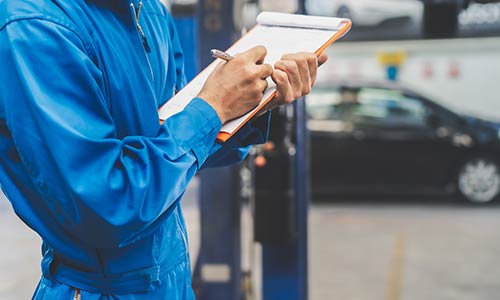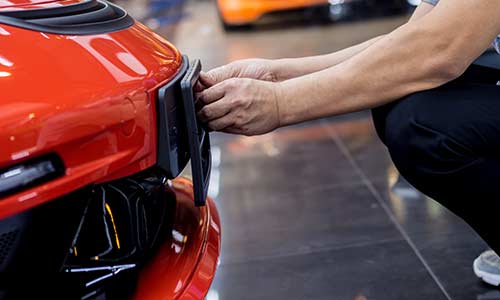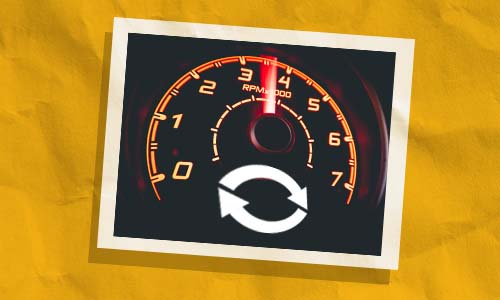Driving without tax: the law explained
Many drivers in the UK must pay an annual tax known as Vehicle Excise Duty (VED), ‘road tax’ or ‘car tax’ to legally drive on the roads.
Car tax rates are adjusted by the Government on April 1st each year, in line with inflation. How much car tax you pay is also determined by which car tax band your vehicle falls into.
If you are caught driving without car tax, you could be fined up to £1,000. Despite the harsh penalties, Government data shows that around 1 in 50 vehicles are untaxed.
In this guide, we will explain the legislation surrounding car tax, including the various penalties you may face for driving without it. We’ll also cover where you can and can’t park without car tax – and the processes to follow when taxing new and used cars.
Unsure whether your car is taxed? Don’t leave anything to chance. Enter your reg number into our free car tax check tool for instant peace of mind.
Get a free valuation
Can you drive without car tax without breaking the law?
It is technically illegal to drive a vehicle on a public road without road tax. However, there are a few exceptions to this rule.
If you are taking your car to a pre-booked MOT test, you are allowed to drive without road tax, as you cannot tax a car without first obtaining a valid MOT certificate.
Many disabled drivers do not have to pay road tax – and many cars over 40 years old have classic car tax exemption. Zero-emission or fully electric vehicles are also exempt from road tax.
However, it is important to bear in mind that even if you are eligible for car tax exemption, you will still need to apply for this.
What is the penalty for driving a car without road tax?
The DVLA runs monthly computer checks on all registered vehicles - and if a vehicle flags up as being untaxed, but not declared SORN (Statutory Off-road Notification), an automated letter and a fine of £80 will be sent to your address (the address of the registered keeper). You won’t be given points on your licence - and if you pay the fine within 28 days, the amount payable will be reduced to £40.
If you fail to pay the fine, you might be prosecuted - and the penalty could be increased to a maximum of £1,000 if the case ends up in court. The DVLA also has the power to clamp your vehicle until the correct amount has been paid.
Do I need to tax my car if it is parked on the road and not being driven?
Yes, if you park your car on a public road, you will need to tax and insure it, regardless of whether it is being driven.
Do I need to tax my car if it is parked on private land and not being driven?
If you intend to leave your car parked on private land without driving it over a prolonged period (and want to stop paying vehicle tax), you must first make a SORN (Statutory Off-road Notification), which notifies the DVLA that you have taken the car off the road.
You might make a SORN for your car if you plan to travel abroad and leave it parked on private land over an extended period – or if the vehicle is undergoing extensive restoration work.
However, it is important to be aware that driving a SORN car on the roads is a serious offence and carries harsher penalties than driving without tax. If caught, you may receive a fine of up to £2,500.
If you wish to take your SORN vehicle back on the road, you must first re-tax it, which will then automatically cancel the SORN.
Owner vs registered keeper of an untaxed vehicle
The registered keeper of a car can be a different person than the owner. However, the registered keeper is the person who is responsible for taxing and insuring the car, checking its MOT status to ensure that it is roadworthy – and following any other legal obligations.
Please see our guide ‘Registered keeper vs owner of a car’ for a full explanation of both roles and how they differ.
Car tax and used cars
Historically, you could transfer vehicle tax to the new owner when selling your car. However, the rules changed in 2014 – and vehicle tax can no longer be transferred. Instead, after ownership of a car is transferred, you can apply to DVLA to get a refund for any full months’ unused road tax.
After purchasing a used car, you will need to tax it yourself before using it on the roads. You can do this online via the DVLA website (or at your local Post Office), using the reference number found in your V5C document.
If you do not have this document, please see our guide ‘How to tax a car without a V5C’ for the process to follow.
Taxing a new car
To tax a new car, you must complete a V55/4 form (downloadable from the DVLA website). (Remember, you must also have valid car insurance in place before driving away.)
If your vehicle is an import (or you have built it yourself), you will also need to register and tax it yourself by completing a V55/4 form.
Taxing a car after passing your driving test
You won’t need to apply for road tax until you’ve got your first vehicle (as the amount of tax due will depend on a variety of factors, such as the vehicle’s emissions and engine size). If you do own a car, make sure you have taxed and insured it before driving.
Getting temporary car tax
The DVLA does not currently offer temporary road tax. So, no matter how long you plan to use the vehicle, you will need to pay for either 6 or 12 months’ road tax.
However, if at any point you no longer need to use the vehicle, you may apply for a refund from the DVLA for any full months’ road tax.
Frequently Asked Questions
There is no grace period for road tax. In October 2014, when paper tax discs were scrapped and road tax was brought online, the existing five-day grace period was also removed.
No, you will not be given points on your licence for if you are caught driving without road tax. However, an automated letter with notification of a fine will be sent to the registered keeper’s address.
When you are caught driving without valid road tax, an automated letter and a fine will be sent to the registered keeper. The letter will tell you how much you have to pay (usually £80) - and how quickly you must pay it. (You might be eligible for a discount if you pay the fine within a certain timeframe.)
If your car isn’t taxed, then you cannot legally drive it on UK roads. This also means that any insurance policies will be invalidated.
Standard speed cameras are there solely to detect motorists driving over the speed limit and aren’t equipped with the technology to catch drivers without tax.
However, some advanced cameras can check registration plates against DVLA records for tax and insurance. These are known as ANPR (Automatic Number Plate Recognition) cameras. ANPR cameras are mounted onto police vehicles – and are also installed on main roads, motorways and car parks.
If you’ve paid for road tax but aren’t planning on using your vehicle, you can apply to the DVLA for a refund for any full months’ tax you have remaining.
If you see a vehicle that isn’t taxed on being used the roads, you can report this to the DVLA anonymously.
You will need to provide a few key details such as the registration, make, model, colour – and location of the vehicle.
If you are unsure whether a vehicle is taxed, you can run a free car tax check to find out before making a report.











